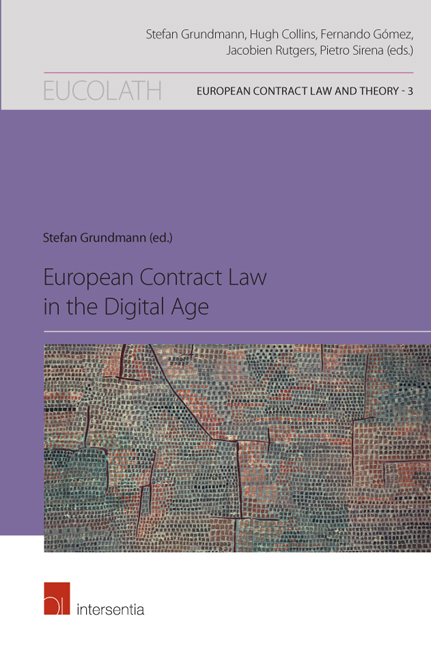Book contents
- Frontmatter
- Contents
- Table of Cases
- List of Authors
- PART I The Overall Architecture
- Part II Institutional Framework – Platforms, Regulation Issues, Global Surroundings
- Digital Contracts in Global Surroundings
- Regulating Online Platforms – The Case of Airbnb
- Crowdfunding in Europe
- Terms of Service are not Contracts – Beyond Contract Law in the Regulation of Online Platforms
- Part III Digital Formation of Contract – More Virtual and More Formalised
- Part IV Development and Implementation of Contract – More Digital, More Liquid
- Part V Digital Objects of Contract – CESL II and More
- Index
- European Contract Law and Theory Series
Regulating Online Platforms – The Case of Airbnb
from Part II - Institutional Framework – Platforms, Regulation Issues, Global Surroundings
Published online by Cambridge University Press: 11 October 2018
- Frontmatter
- Contents
- Table of Cases
- List of Authors
- PART I The Overall Architecture
- Part II Institutional Framework – Platforms, Regulation Issues, Global Surroundings
- Digital Contracts in Global Surroundings
- Regulating Online Platforms – The Case of Airbnb
- Crowdfunding in Europe
- Terms of Service are not Contracts – Beyond Contract Law in the Regulation of Online Platforms
- Part III Digital Formation of Contract – More Virtual and More Formalised
- Part IV Development and Implementation of Contract – More Digital, More Liquid
- Part V Digital Objects of Contract – CESL II and More
- Index
- European Contract Law and Theory Series
Summary
ABSTRACT
Platform services, such as Airbnb, Uber, eBay, Amazon, TaskRabbit and many more have rapidly emerged and taken over parts of existing markets for services. Airbnb's peer-to-peer accommodation rental platform competes with hotels in many cities, whereas Uber has entered existing markets for taxi services in many large cities around the world. Innovative services such as these have been welcomed by many users but they also create new challenges: how can users be protected against health and safety risks, are payment systems safe, are effective dispute resolution mechanisms available? Besides typical private law issues concerning the division of responsibilities between the platform and its users, also broader concerns have arisen in relation to market regulation and public order. The aim of this contribution is to ‘unpack’ the legal relationships within one platform service – Airbnb – to provide a basis for discussion of the question whether regulation of platform services is needed and if so, in what form.
INTRODUCTION
Like other platform services, Airbnb has become a favourite of digitally savvy consumers who know that some of the greatest benefits of our globalising society can be found online. Offering a platform through which hosts can advertise their apartments to potential guests worldwide, Airbnb provides a real, and in many ways attractive, alternative to visitors who are looking for something else than a hotel room. Tourists who would normally have booked a hotel room on a city trip to New York, Paris or Barcelona, can find a fully furnished apartment with all amenities instead – and oft en cheaper than a hotel too.
Behind the gleaming façade, the housing platform provided by Airbnb may, however, have some hidden cracks in terms of legal protection that both hosts and guests should be aware of. This chapter discusses the private law relationships that arise between the three parties involved in a home rental through the website: the online platform (Airbnb), the host and the guest. As will be seen, although some improvements have been made, the legal relationships that hosts and guests enter into are strongly characterised by an ‘at your own risk’ (AYOR) approach.
- Type
- Chapter
- Information
- European Contract Law in the Digital Age , pp. 87 - 102Publisher: IntersentiaPrint publication year: 2018



